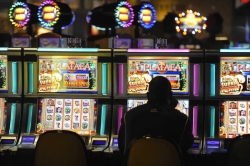
Maryland Also Debated Exclusion Laws in Recent Years
New Jersey is considering a particular kind of “no-shame” self-exclusion law. The law would allow people to ban themselves from casinos in the state by adding their name to an exclusion list. In the case of the New Jersey law, gamblers could sign up for the list without having to admit they have a gambling problem.
One issue many people have with a self-exclusion list is the implication that a gambling addict must admit they have a problem. Since such admissions are seen as a first step towards recovery, some exclusion advocates believe a person who lists themselves as a problem gambler is on their way to conquering their addiction problem.
The current law requires people to admit they have a gambling problem. Some are hesitant to do this, fearing privacy concerns. They feel such an admission could be used against them later in life, whether it’s to shame and humiliate them in the public forum, exclude them from job considerations, or hurt their standing in court cases.
Tourism and Gaming Chairman Hopes to Change the Law
Ralph Caputo, a Democratic assemblyman from Essex County and the chairman of New Jersey’s Tourism and Gaming Committee, is supporting the changes to the current law. Chairman Caputo says, “Admitting on a document that you are a problem gambler is a step many New Jerseyans may not be ready to make, even if they are confronting their problem. Many may feel that document is a stigma that can be used against them, but with this option, they are getting some help without having to make that potentially embarrassing admission.”
Council on Compulsive Gambling Agrees
The head of the state’s Council on Compulsive Gambling, Donald Weinbaum, says the new law would take some of the stigma off the list. Weinbaum said, “Our concern was that some people would not be comfortable with the labeling….The terminology is really important. We have heard from a number of community members who questioned why they need to label themselves, or give any reason at all to self-exclude.”
In many cases, players feel it’s no one’s business why a person should want to be on the exclusion list. If a citizen wants on the list, they should not have to explain themselves. Mr. Weinbaum added, “We should not put up barriers for anyone who wishes to self-exclude.”
Lists for Online and Land-Based Casinos
Two exclusions lists exist: one for land-based gambling and one for online betting. In either case, those who register for exclusion can choose to be excluded for one year, five years, or an entire lifetime. Between the two lists, 1,575 New Jerseyans have registered. With over 150,000 signups for online casino accounts in the past three months and millions visiting Atlantic City casinos each year, anti-gaming groups like the Council on Compulsive Gambling believe less than 2,000 excluded citizens is a low figure.
Exclusion Laws around the Globe
Exclusion laws are common in state and countries where gambling is licensed and regulated. In the 2013 Australian national elections, politicians debated whether to expand such lists, as well as how easy it should be to exclude oneself. Those in favor of greater exclusions even advocated for a nationwide move to modernize gaming machines, in order to make it easier to join the list.
In recent years, lawmakers in the State of Maryland have debated how best to frame exclusion laws, so citizens who felt they could not control their tendencies would receive the most protection.
Maryland citizens who signed up for their list have discussed their experiences. “Bob”, a 59 year old gambler who attends regular Gamblers Anonymous meetings, said the process felt “strange”, despite receiving professional and empathetic treatment from the official who took down his name. When Bob spoke to the Baltimore Sun, he declined to give his full name.
Adding to the uncertainty is the fact that many signees are from out of state. In the case of Maryland, 40% of the gamblers who have joined the land-based exclusion list are from states other than Maryland. Trusting that another state’s bureaucrats will be responsible with a person’s private information is less likely than trusting one’s own government, so a list which does not force an admission might draw more signatures.
